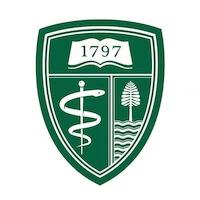Biomedical Data Science Grand Rounds
Speaker: Matt Mahoney, PhD, Assistant Professor of Neurological Sciences, Robert Larner College of Medicine, UVM
Please join us for Biomedical Data Science Grand Rounds with Matt Mahoney, PhD, Assistant Professor of Neurological Sciences, Robert Larner College of Medicine, UVM on Thursday, March 21 at 12:00 p.m. in Chilcott Auditorium (Geisel School of Medicine, Hanover Campus).
Talk title: “Network-based machine learning for overcoming the resolution barrier of classical genetic mapping”
Refreshments will be served on a first-come, first-served basis.
Abstract
The goal of genetic mapping is to identify mutations that cause trait variation. Classical mapping methods, such as quantitative trait locus (QTL) mapping, are labor and resource intensive, and rarely followed through to a final causal mutation. This is because QTL mapping typically only identifies a large genomic locus containing tens to hundreds of candidate genes. Traditionally, choosing among these candidates requires either extensive further experimentation or ad hoc guesswork based on literature searches of candidate genes, which is error prone and strongly biased toward known biological functions. We have developed a novel machine learning framework to systematically nominate candidate genes based on functional genomic networks, which encode gene-gene interactions by rigorously integrating up-to-date genomic data with human curated functional annotations. We recently applied our strategy to a novel Alzheimer’s disease (AD) QTL for contextual fear learning, a behavioral trait related to cognitive function, in a novel genetically diverse mouse model of AD. This locus contained dozens of genes, and represents a typical use case for our strategy. The top-ranked gene in our model was Ythdf3, a virtually un-annotated gene, which has only recently been studied in relation to the translation of m6A-modified mRNAs in neurons and may be associated with neuro-regeneration. We hypothesize that Ythdf3 plays a role in the decline in learning seen in AD. The nomination of Ythdf3 would not have been made by traditional criteria, such as non-synonymous mutations, differential gene expression between alleles, or known biological function. Nevertheless, emerging data strongly implicate Ythdf3 in learning and memory, and demonstrate the power of our approach to nominate highly non-trivial candidates for biological follow up.
Biography
Matt Mahoney is a computational systems biologist specializing in neurological disease. His fundamental goal is to develop novel tools to model the genetic, molecular, and functional networks underlying complex neurological diseases. He received his doctoral training in mathematics at Dartmouth College, graduating in 2009. He then worked as a post-doctoral fellow with Dr. Michael Whitfield at the Geisel School of Medicine (2010-2013) studying the complex networks underlying gene expression, and later as a post-doctoral fellow with Dr. Rod Scott at the University of Vermont Larner College of Medicine (2012-2016), studying the functional networks of neuronal interactions in behaving animals. He is currently an Assistant Professor in the Department of Neurological Sciences with a secondary appointment in the Department of Computer Science at the University of Vermont. His research currently focuses on systems genetics, which uses network theory to identify genetic modifiers of disease phenotypes. He is currently funded by an R21 through the National Library of Medicine to develop novel network-based tools to predict modifier genes by integrating epistatic interaction networks with functional genomic networks.
